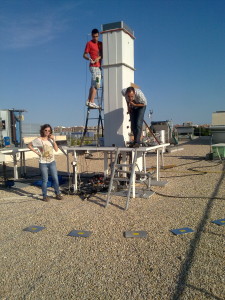A doctoral thesis proposes changing the design of cooling towers to improve efficiency and prevent Legionella
Campus, Elche, Fuente, Investigación, Investigaciones, Noticia, Front UMH
4 November 2014
The Experimental characterization and modeling of the binomial distribution system-drift eliminator in cooling towers doctoral thesis by Javier Ruiz Ramírez of the Mechanical Engineering and Energy department at the Miguel Hernández University of Elche (UMH) proposes improvements in the designs of distribution system-drift eliminators to improve the energy efficiency of these installations and prevent cases of Legionella.
 The thesis, presented at the Technical University of Cartagena (UPCT), was directed by Manuel Lucas Miralles and Antonio Sánchez Kaiser. Emissions of droplets produced by cooling towers, reminds the thesis, can generate a propitious breeding ground for the appearance of bacteria, such as Legionella, a risk to human health. “The trials carried out permitted validating a model that may be helpful in finding a source of Legionella or simply for assessing the environmental impact of a tower,” explains the UMH faculty member.
The thesis, presented at the Technical University of Cartagena (UPCT), was directed by Manuel Lucas Miralles and Antonio Sánchez Kaiser. Emissions of droplets produced by cooling towers, reminds the thesis, can generate a propitious breeding ground for the appearance of bacteria, such as Legionella, a risk to human health. “The trials carried out permitted validating a model that may be helpful in finding a source of Legionella or simply for assessing the environmental impact of a tower,” explains the UMH faculty member.
This research, part of the doctoral program of the Department of Thermal and Fluids Engineering at the UPCT, and which received support from the Ministry of Science and Innovation, developed a software application for detecting, with water sensitive paper, the quantity of drops emitted by an experimental cooling tower. A weather station and a drop-pressure tunnel placed alongside the tower characterized all atmospheric variables.
The data compiled in the thesis allowed establishing that a change in the distribution system-drift eliminator affects up to 82% of the volume of droplets emitted and that the energy efficiency of cooling towers can be improved by 20% and that the water outlet temperature can be reduced by one degree.
“Cooling towers are intended to dissipate the thermal load generated. In large installations, this is usually accomplished by a cooling tower, whose function is to collect the hot water resulting in the process, remove the heat, and cool that water. The colder the water we draw the more efficient the cooling process will be,” explains UPCT associate professor Antonio Sánchez Kaiser.
Javier Ruiz Ramírez is already working on a new research project between the UMH and UPCT for integrating renewable energy into conventional processes of power generation and heat dissipation.